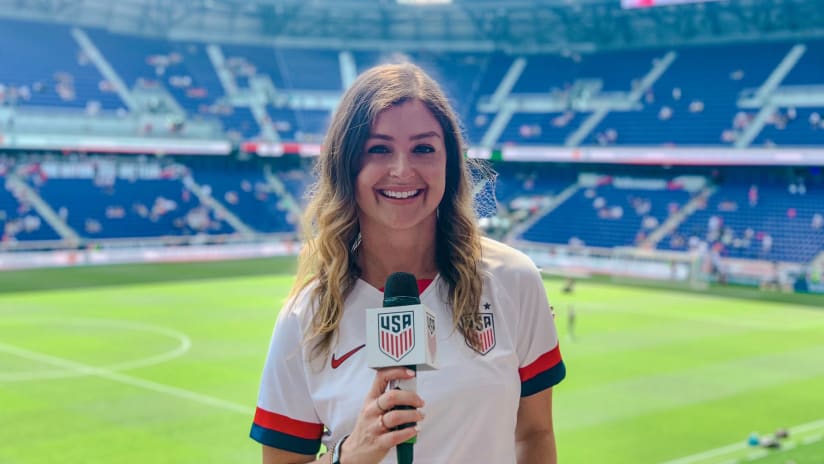Why is it important to talk about mental health?
It's important because we all deal with mental health in one way or another. It doesn't matter who you are or what you do, mental health is something that needs to be talked about. For a long time, players thought that they couldn't talk about their feelings or their mental health if they were a high-performing athlete. The general thought was that athletes had to be tough. If you got hurt, you had to just push through it. Although I relate to this as a former athlete, I think it can be relatable to anybody in whatever position they're in. Everyone deals in some way or another with things that are difficult and mentally straining. We have to be able to have a way to cope with those emotions and to acknowledge them and at times accept them. I think that is an important part of our personal growth as humans.
Have you seen a shift in the discussion around mental health since your playing days?
Well, I believe one of the individuals you spoke to for these interviews is the Director of Mental Performance for the Colorado Youth Soccer Club. We didn't have that before. So, I think I would like to start by acknowledging that. I think there's been a lot of advancements at the youth level. Speaking to NWSL, I know now with the Players Association, they have resources that these players can access. I think that league in general has been through so much in the last few years and so much has been exposed and players are not afraid to speak to somebody anymore to address some of their mental health concerns. I think there is real growth in that. For the players, the needle needed to be moved and they have been willing to stand up for themselves but really needed to be given the support to do so. I think we are getting to a place where we do see more people willing to accept that they’re not okay and that they do need some help and we are seeing more resources for them to get that help.
How did you deal with the mental pressure that comes with being a professional athlete?
It's one of the things I go two ways with. A part of me really loves that I can push through things, and I can be strong and tough. I always felt like I was one of those athletes that people would look to because I was mentally strong, I could push through things. At the end of the game when my team needed that extra bit of focus, I was the player that could bring that. I really appreciate that about myself. However, I do think that it can be difficult. There is the other side of it where if you can't push through something, if you are dealing with something that has really gotten into your brain and makes it difficult for you to focus because you can't stop thinking about it, or you don't believe in yourself anymore, then you feel like you've lost your identity because you're not that strong, tough athlete anymore. There are two sides of the coin, and you have to address them both equally.

You experienced three ACL tears throughout the course of your career. Can you talk about the mental toll that took on you during your playing career?
I had three ACL surgeries in a five-year span. Those were the most challenging days of my life. I get emotional speaking about it because I went from such a high playing level to moments where I had thoughts that I never thought I would have about the future of my career. I think the difficulty of a major injury, especially when you're an athlete, is very challenging. I would say the thing about being a high performing athlete is you get so much of your creativity dump and adrenaline fix from playing and then you go through withdrawals when you go into the injury period. When you take that all away at the same time, it can take a mental toll on anybody. I think the biggest thing that I noticed in my injuries is, as I mentioned, I always felt like I was a really strong, mentally tough athlete and I was in the midst of this injury and it was very hard and mentally challenging. One of the things I think is really important when we talk about this ‘New Day’ campaign, is some of the hardest times of your life, you look back at them and they become the times where you grow the most. You learn the most about yourself and you start to implement certain practices like journaling, prayer or meditation to maintain your mental health and to make you a better person. I look back now and I wouldn't change a thing, which is crazy to me. If I didn't go through that, I don't think I would be the human I am today. The growth that I had during those injuries is something anybody can have. You always have the choice to look at your struggles as an opportunity to address all the areas of your life that need work.
How did you handle the mental strain of your transition from professional athlete to on-air talent?
I was in between teams and had gotten waived from my team in Western New York. From there, I went on trial in Portland and my knee just couldn't take the turf. I was there for a week and my knee blew up every single day. So, I had to address the fact that this just isn't going to work out. I came back home, and I went on a hike by myself. For me, that is when I talk to God. I was on that hike, and I just felt like it was the end of the road for me in my playing career. Funny enough, I felt calm at that moment. I can remember being in that place on the hike in Morrison, and I can feel the wind, I can feel everything. I just knew there was a calm sense about me that made me feel like I was making the right decision. One of my best friends said the best thing to me at the time. She said, “Jordan, no matter when it's over, you're going to be sad because it has been the biggest part of your life, but just because it's sad doesn't mean it's the wrong decision”. That really resonated with me because decision making is hard, especially when talking about your mental health. Soccer was my whole life and I just remember crying and thinking I was sad, but I was also so thankful to be walking away from it. I was the one who got to make the decision about hanging up my boots for the last time. I didn't know how stressed I was being a professional soccer player until after I made that decision. The next morning, I woke up with the clearest brain I've ever had. There was so much stress in waking up every day and having to evaluate my body. The next morning I woke up and for the first time my brain was just like, good morning. That was it. I felt at peace about it. I was taking all those stresses out in my life that were a part of the job. We all have stressors that come with our jobs, but it was nice to know that I could start fresh and new and decide what was next with a clear brain.

